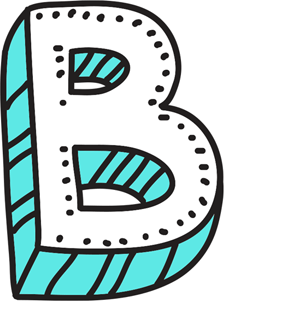
Don't know what a word means?
Click on the letters below to find out more.


-
Bacterial Vaginosis
A common infection in the vagina caused by an imbalance of bacteria. It can cause a strong fishy smell and a thin grey or white discharge. It's not an STI, but it can be triggered by sex and is treated with antibiotics.
-
Balls
A slang word for testicles. People with a penis usually have two testicles, which are found in the pouch of skin (scrotum) below the penis. They make sperm and testosterone (a hormone).
-
Bareback
This refers to having penetrative sex without a condom. This is sometimes glamourised. If you are having sex with multiple people and/or are not on contraception it is not recommended to take the risk with your sexual health.
-
Binding
A practice used by some trans and non-binary people to flatten their chest with the use of special compression garments.
-
Bisexual
A person who feels romantic and/or sexual attraction to more than one gender, for example, to both men and women, or to people of different gender identities. People may use 'bi' for short.
-
Blow Job
Oral sex involving the penis. This is when someone uses their mouth, lips or tongue to give pleasure to a partner's penis. It's also called "giving head" or "going down on someone." Like all sexual activities, it should always involve consent.
-
Body image
How you think and feel about your body. This can affect self-esteem, confidence and mental health.
-
Breakup
When a romantic or sexual relationship ends. This can be an emotional time and it's okay to feel lots of different things.
-
Breasts
Also called boobs or tits. Breasts grow during puberty and can produce milk for feeding babies. Nipples and breasts can also be sensitive and feel good to touch for some people during sex.
-
Bum
This is someone's backside/buttocks. For some people this is a part of the body that is sexually exciting. People might also use the term ass or gyat. These are also often used in Multicultral London English (MLE). Batty comes from the Jamaican dialect Patois and Nyash derives from the Nigerian language Yoruba, where they mean the same. These terms reflect how language is adopted from different cultures.

Click a button below to find a list of local services in your area if you need help or advice.

Are you ready to have sex?
It can be difficult to decide whether it's the right time for you to have sex. You should know that whatever anyone else might say, the decision to have sex for the first time or anytime is YOURS. It might feel ok to do it or it might not feel ok. You need to trust your instincts and do what is right for you.
Possible pages that this section could link to

Be clear on consent
It is important that sex is always consensual. This means being conscious enough and safe/comfortable enough to say yes to any type of sexual contact, whether that's talking about sex, touching, or taking part in sexual acts. It's about both parties feeling actively excited and comfortable in a sexual situation. Remember you can change your mind at any point, whether that means saying "no" or stopping any kind of activity.
Possible pages that this section could link to

Contraception choices
If you are thinking about having sex and you don‘t want to become pregnant then you need to use a method of contraception. Most methods of contraception will not protect you from sexually transmitted infections so whatever method you choose you also need to think about protection (avoiding getting a sexually transmitted infection). For this you'll need to use condoms.
Possible pages that this section could link to

Do you need more help or advice?
If you still have unanswered questions, you can go to a service in your area for information & advice:




























